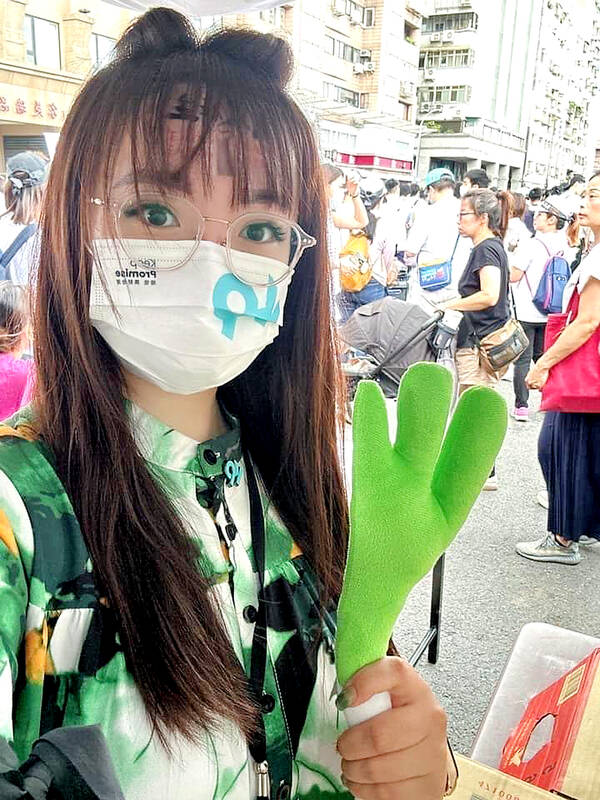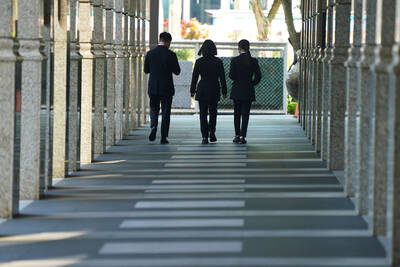Nothing like the spectacular, dramatic unraveling of a political party in Taiwan has unfolded before as has hit the Taiwan People’s Party (TPP) over recent weeks. The meltdown of the New Power Party (NPP) and the self-implosion of the New Party (NP) were nothing compared to the drama playing out now involving the TPP.
This ongoing saga is so interesting, this is the fifth straight column on the subject. To catch up on this train wreck of a story up to Aug. 20, search for “Donovan’s Deep Dives Ko Wen-je” in a search engine.
ANN KAO SENTENCED TO PRISON YET AGAIN, AUG. 21

Photo: Taipei Times file
A “famous Ko fan” with a strong social media following, Chang Chiao-yu (張喬瑜), picked the early morning of Aug. 21 to slam the TPP and announced she was leaving the party. She said that since the prison sentence of seven years and four months was handed down to then-TPP Hsinchu Mayor Ann Kao (高虹安) on July 26, the crisis facing the TPP caused her to break down crying three times. Other social media influencers were soon to follow her lead.
Coincidentally, this very same day Kao was sentenced to another 10 months in prison for falsely accusing a US academic of defamation. In 2021 and 2022, posts on Facebook by Chen Shih-fen (陳時奮), a political pundit and director of Western Washington University’s Center for International Business, who was writing under the pseudonym Tario Ong (翁達瑞), correctly identified 18 areas where Kao had plagiarized content in her doctoral thesis for the University of Cincinnati without citation.
PEGGY CHEN’S NEW DEFENSE, AUG. 22
The morning of Aug. 22 brought two Taiwan independence activists to the street outside TPP chair and former Taipei Mayor Ko Wen-je’s (柯文哲) residence. They shouted at Ko’s residence and spraypainted “Ko Wen-je’s family are all ‘zei’” (柯文哲一家都賊) in blood red on the street. My dictionary unhelpfully translates “zei” to “thief; traitor; wily; deceitful; evil; extremely” but after seeing the word used a fair bit I have come to the conclusion — and if anyone has a better translation I would be happy to hear it — that it means roughly “a literal or figurative criminal or violation of trust, responsibility or duty to the level of provoking outrage.” I know, pithy, right?
This day also brought indications that the earlier revelation involving Ko’s wife Peggy Chen (陳佩琪) was not going away, and that Chen herself was nervous about it for some reason. The former head of TPP’s Hsinchu office had alleged that Chen visited a luxury apartment valued at NT$120 million located near the Legislative Yuan in July. That same source added more details, including that she also saw other luxury residences and that she visited the one in question with a bigshot TPP financial backer.
Chen first maintained that she wanted her son to get married as he was already 30, and she was looking at residences to help make that happen. Ko also said that she was “just looking,” which at the time sounded reasonable to me in the sense of checking out a luxury car while at the car showroom.
Chen denied that she had visited the place with any financier, but she also posted on Facebook that she had been looking at for sale residences in the past three or four months because her three children had moved abroad and she had empty nest syndrome, and depression had come quickly.
She said she then quickly set about looking to do things she had previously wanted to do but had not. Then she added “the summer evenings are cool, the breeze caresses, living leisurely with nothing to do, (I) go out into the neighborhood and look at houses…”
On the surface this comes across as a mildly unusual hobby, but empty nest syndrome and depression are very real and any hobby that helps with those are to be welcome, though wasting a real estate agent’s time is a rude, jerk move. However, something struck me as very odd about this. It seemed to at least partially contradict her previous explanation and it came across as overly needy to convince everyone that there was nothing to be suspicious of.
Senses tingling, this was now a story to watch, there might be something more to it. As we will see, that is very much the case.
The TPP had been continuing their regular press conferences to disclose their progress in their ongoing investigation into the issues surrounding last year’s presidential campaign finances.
Up to this point the TPP had admitted gross problems with the financial filings, had initially tried to blame it all on an outside contracted accountant, but with everyone questioning how he got away with it with no oversight, Ko’s campaign director Vivian Huang (黃珊珊) resigned from the Central Standing Committee. She was later suspended by the party for three years, though she retains her legislative seat as she is still technically a member.
On this day Huang claimed that the internal investigation was not the players simultaneously being referees. It was also revealed that eight campaign contributions came from Japan and nine from China, Hong Kong and Macau, though Ko claimed that “tentatively” they believed they all came from Taiwanese national ID holders and therefore as citizens they were all legal.
A former regular foil of Ko’s during interpellation sessions when Ko was mayor and he was a city councilor, current Democratic Progressive Party (DPP) legislator Wang Shih-chien (王世堅) said that while Ko might get off with fine or a light jail sentence, he would bring lunch boxes to Ko if he went to prison. He added that Ko’s political career had already been given a “death sentence.”
Wang is one of Taiwan’s most interesting politicians who has humorously embraced the fact that he looks like the murderous doll from the Chucky movies. He is famous for making outrageous bets, losing them and having to jump into bodies of water, and for bringing gifts to the Taipei City Council for Ko to mock him, including such things as Chinese emperor robes.
As a side note, in discussing the ongoing story of Ko’s so-called “secret” meetings on the Core Pacific City Mall case, Taipei City Councilor Chung Siao-ping (鍾小平) of the Chinese Nationalist Party (KMT) had no special revelations on those, but did reveal that when Ko would try and get KMT city councilors support he would drink with them from 6pm to 10pm, and no matter the type of alcohol he could really hold his liquor.
“SWALLOW A FIELD HOCKEY STICK,” AUG. 23
In response to Wang’s comments from the previous day, Ko on Aug. 23 called him a “smart ass” and said “if you are going to bet, bet big. If I am not imprisoned, how about you swallow a field hockey stick, let’s bet big.”
“Swallow a field hockey stick” comes up from time-to-time and refers to this being made a bet at a press conference in 2014 over allegations of corruption involving a former Changhua County commissioner and the national field hockey association, and the image was so ludicrous and funny the reference stuck and became part of local political culture.
Ko posted on Facebook another apology to his supporters in the presidential race, who had taken on the nickname “little grass sprouts” (小草, literally ‘little grass’ but the sprout is implied and explicitly made clear in their symbology). However, instead of apologizing for overall gross mismanagement as head of the party, as the head of the presidential campaign or for having dismantled previous financial oversight provisions that had previously been in place precisely to avoid these problems in the first place, he instead lamented having trusted his high school classmate from 50 years ago as his campaign finance director. In other words, his message was “this is all a big mistake because I am such a nice, trusting guy.”
The same day on the TPP’s Youtube channel “Voice of the People” (民眾之聲), Ko stated that in the financial filing there were “no fake receipts or fake entries,” and the problem was “procedural errors” and “disorderly entries.” Incidentally, on the bannerhead of the TPP’s Youtube channel is the slogan “clean and active government, love the people, love the land.”
He went on to say that the TPP’s financial accounts were “definitely cleaner than the blues or greens,” implying that the TPP’s problems were not down to dishonesty, unlike the DPP and KMT.
That “Voice of the People” video was not helped when on the same day one of the channel’s presenters, Osmar Hsu (許甫), on another talk show broke down crying and said “to be honest, our trustworthiness is totally bankrupt, everybody thinks every entry (in the financial filing) has a problem.”
THESE RELATIVELY QUIET FEW DAYS DO NOT LAST
These three days were terrible for the TPP, but relatively speaking quieter than any other three-day stretch since Aug. 6, when Grace Woo (吳靜怡) revealed that the TPP’s financial filings were not anywhere near true and had huge holes. In the next column we will examine how Peggy Chen’s visit to a NT$120 million luxury apartment was actually the loose thread that threw open a much, much more damaging and ugly story.
Donovan’s Deep Dives is a regular column by Courtney Donovan Smith (石東文) who writes in-depth analysis on everything about Taiwan’s political scene and geopolitics. Donovan is also the central Taiwan correspondent at ICRT FM100 Radio News, co-publisher of Compass Magazine, co-founder Taiwan Report (report.tw) and former chair of the Taichung American Chamber of Commerce. Follow him on X: @donovan_smith.

JUNE 30 to JULY 6 After being routed by the Japanese in the bloody battle of Baguashan (八卦山), Hsu Hsiang (徐驤) and a handful of surviving Hakka fighters sped toward Tainan. There, he would meet with Liu Yung-fu (劉永福), leader of the Black Flag Army who had assumed control of the resisting Republic of Formosa after its president and vice-president fled to China. Hsu, who had been fighting non-stop for over two months from Taoyuan to Changhua, was reportedly injured and exhausted. As the story goes, Liu advised that Hsu take shelter in China to recover and regroup, but Hsu steadfastly

Taiwan’s politics is mystifying to many foreign observers. Gosh, that is strange, considering just how logical and straightforward it all is. Let us take a step back and review. Thanks to the Chinese Nationalist Party (KMT) and the Taiwan People’s Party (TPP), starting this year people will once again have Christmas Day off work. In 2002, the Scrooges in the Democratic Progressive Party (DPP) said “bah, humbug” to that. The holiday is not actually Christmas, but rather Constitution Day, celebrating the enactment of the Constitution of the Republic of China (ROC) on December 25, 1947. The DPP and the then pan-blue dominated legislature

Focus Taiwan reported last week that government figures showed unemployment in Taiwan is at historic lows: “The local unemployment rate fell 0.02 percentage points from a month earlier to 3.30 percent in May, the lowest level for the month in 25 years.” Historical lows in joblessness occurred earlier this year as well. The context? Labor shortages. The National Development Council (NDC) expects that Taiwan will be short 400,000 workers by 2030, now just five years away. The depth of the labor crisis is masked by the hundreds of thousands of migrant workers which the economy absolutely depends on, and the

If you’ve lately been feeling that the “Jurassic Park” franchise has jumped an even more ancient creature — the shark — hold off any thoughts of extinction. Judging from the latest entry, there’s still life in this old dino series. Jurassic World Rebirth captures the awe and majesty of the overgrown lizards that’s been lacking for so many of the movies, which became just an endless cat-and-mouse in the dark between scared humans against T-Rexes or raptors. Jurassic World Rebirth lets in the daylight. Credit goes to screenwriter David Koepp, who penned the original Jurassic Park, and director Gareth Edwards, who knows